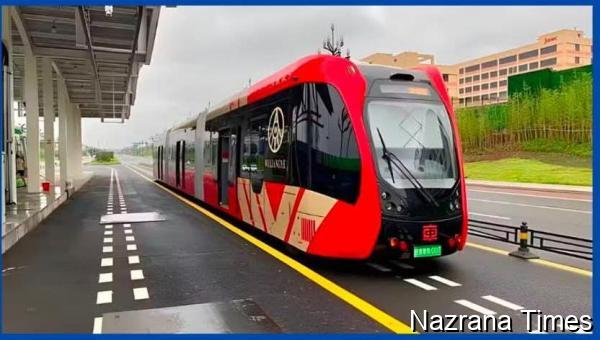Pak Punjab historical city Lahore Welcomes Pakistan’s First Super Autonomous Rail Rapid Transit (SRT)
- Internationl
- 18 Jul,2025

Lahore, Ali Imran Chattha
Trackless “virtual rail” train arrives for trial — A glimpse into the future of public transport
In a significant step toward revolutionizing urban mobility, Lahore has received Pakistan’s first Super Autonomous Rail Rapid Transit (SRT) vehicle — a futuristic, trackless train that runs on virtual rail technology. The arrival marks the beginning of a trial phase that could shape the future of public transportation in the country.
According to the transport Authorities, this state-of-the-art vehicle is not your traditional train. Often dubbed a “subway on wheels,” the SRT operates without physical tracks, relying instead on virtual track technology — a sophisticated digital navigation system that guides the train precisely along pre-programmed routes on standard roads.
The sleek, multi-carriage vehicle resembles a modern light rail train but runs like a bus, offering the best of both worlds: the speed and capacity of a train with the flexibility of a bus. Each unit is equipped with autonomous driving capabilities, AI-based sensors, and LiDAR systems to ensure safe and accurate operation.
The technology has already been successfully adopted in cities across China, and is also in operation in Malaysia, the United Arab Emirates, and Turkey. It was first launched in 2021 in Jiangsu Province, China, and later honored with the prestigious Zhan Tianyou Award — considered one of the highest recognitions in Chinese civil engineering.
The SRT system is designed to be cost-effective and environmentally friendly, significantly reducing the need for expensive rail infrastructure, excavation, or elevated tracks. It can carry hundreds of passengers and is ideal for cities where traditional metro systems are difficult or too costly to implement.
In Lahore, the vehicle will undergo trial runs as part of a feasibility study. The goal is to evaluate how well the system performs under local conditions — from traffic and road quality to passenger demand.
At this stage, no official dates have been announced for a full rollout. For now, authorities are closely monitoring the test to determine whether the SRT can be scaled up as a permanent solution to Lahore’s growing transport needs.
If successful, this could mark the dawn of a new era in Pakistan’s urban transit — one that blends cutting-edge innovation with practical, street-level implementation.
Posted By:
 GURBHEJ SINGH ANANDPURI
GURBHEJ SINGH ANANDPURI


Leave a Reply